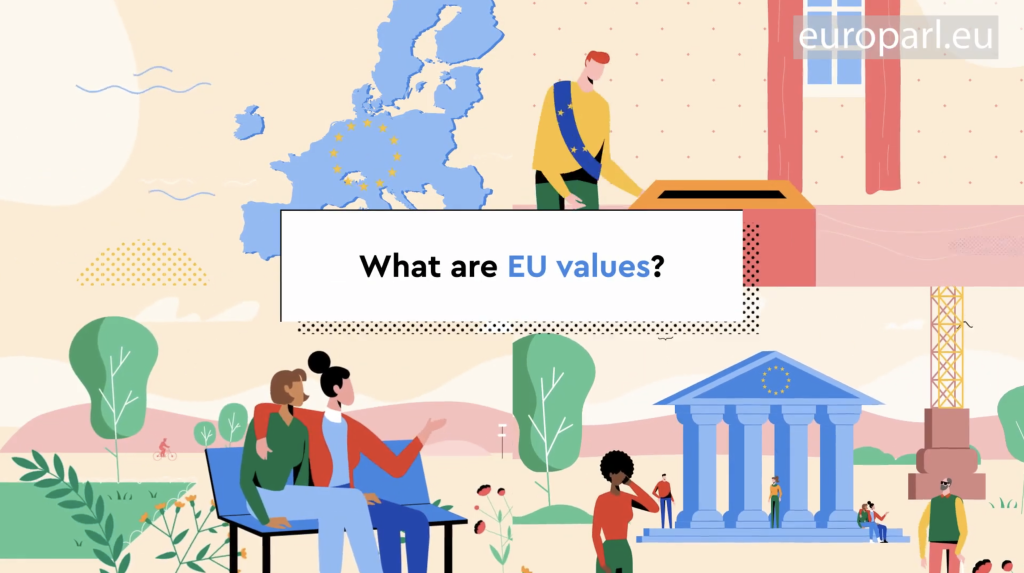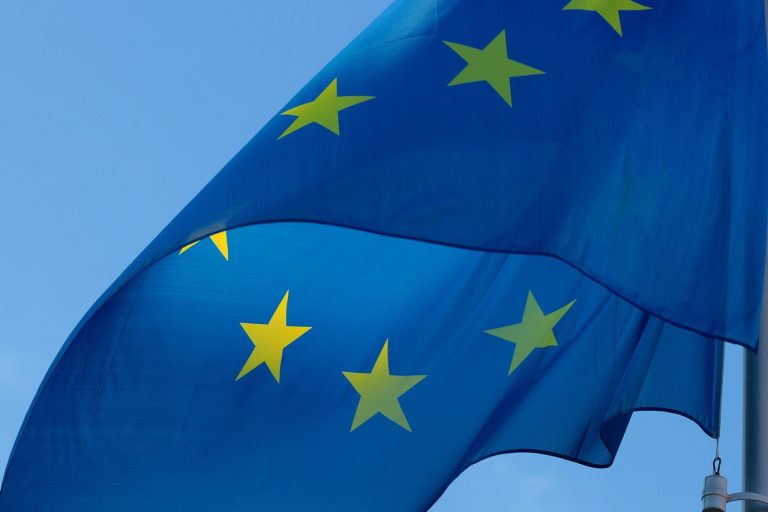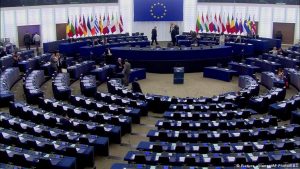On November 4th, 2025, World Youth Alliance Europe publicly addressed the project review letters (available at the bottom of the text) issued by the European Education and Culture Executive Agency (EACEA) concerning 3 separate Erasmus+ grants that WYA Europe implemented throughout 2024. As noted in the article, these letters do not allege any failures in project delivery, financial management, or legal compliance. Instead, they hinge on an interpretation of “EU values” that extends far beyond their legal definition, relying on non-binding political resolutions and policy communications as if they were binding law. This approach raises important questions about institutional neutrality, pluralism, and the lawful scope of EU competences.
The EACEA review repeatedly asserts that WYA Europe’s educational content does not align with what it refers to as “established EU positions” on “sexual and reproductive health and rights”. However, the documents the Agency cites as evidence of these positions are non-binding political or policy texts, not legal standards. These include the European Parliament Report on Sexual and Reproductive Health and Rights in the EU (2021/1169(INI)), commonly known as the Matić report, as well as Commission policy frameworks such as the LGBTIQ+ Equality Strategy 2026–2030 and the Roadmap for Women’s Rights – Commission Communication. These documents reflect the views and priorities of the institutions that produced them at a given time. They do not create legal obligations for citizens, civil society organizations, or Member States, and they cannot be used to redefine compliance with Article 14.2 of the Grant Agreement, which is grounded in the binding values listed in Article 2 TEU and the Charter of Fundamental Rights.
This distinction is of great importance, in fact it is foundational to the structure of the European Union and to the way civil society is allowed to operate within it. The Union operates under the principles of conferral and subsidiarity, meaning it possesses only the competences explicitly granted to it by Member States in the Treaties. In the fields of sexual and reproductive health, abortion legislation, and sexuality education, the Treaties are unequivocal: these are not EU competences, but competences of the Member States.
This is confirmed repeatedly in official EU statements. When answering parliamentary questions, the European Commission affirmed in answer E-000870/2020 that it “has no competence to introduce legislation on abortions in the Member States” and would thus “not support specific activities and projects, which promote better access to legal abortions, through the upcoming multiannual financial framework for 2021-2027.” In Answer E-005924/2020, the Commission clarified that “legislative powers on sexual and reproductive health and rights, including abortion, lie with the Member States that are responsible for the definition of health policy.” Most recently, in Answer E-003006/2024, the Commission reiterated that questions of sexual education and SRHR “lie within the competences of the Member States,” and that the EU’s role is limited to cooperation and support where needed, not harmonization or enforcement of a single position.
The EACEA’s reasoning in the project review letters disregards this legal reality and opts for an unsustainable misinterpretation of EU law. When EACEA claims that WYA Europe’s positions are “at odds with established EU positions” it uses non-binding policy documents as those “established positions”. The EACEA claims that its expert reviewers have “identified a reference frame of guidance beyond the general framework of the TFEU, the EU Financial Regulation and the grant agreements themselves as regards to aspects of sexual and reproductive health and rights”. This is a worrisome formulation. They explain that this framework includes the European Parliament resolution of 24 June 2021 on the situation of sexual and reproductive health and rights in the EU, in the frame of women’s health (2020/2215(INI)) (2022/C 81/04)), the European Parliament resolution of 14 September 2021 on LGBTIQ+ rights in the EU (2021/2679(RSP)) and other documents. This not only exceeds the Agency’s mandate: it contradicts the limits of EU competence explicitly recognized by the Commission itself.
Furthermore, the review implies that presenting reproductive health activities without advocating for abortion places WYA Europe at odds with “established EU positions”. In one instance, for the project Women’s Health Goes Digital, WYA delivered a Training program and methodology for informing and educating girls and young women on their mental and reproductive health. The reviewers remarked on this deliverable: “The word ‘abortion’ appears only once in the section on the Legal Framework for the Right to Health in the EU (p. 19). No lessons are devoted to it.”
In the review of the Operating Grant 2024, the EACEA concludes that WYA Europe presents “one-sided and biased material on sexual and reproductive health rights.” How do they justify this claim? By stating that the materials “omit certain topics or present them in a negative way”, and the example they give, among others, is abortion.
In the review of the Youth Act 2024, the EACEA notes that a deliverable titled Policy paper on women’s mental and reproductive health is mostly ”neutral, and unobjectionable – such as advocating for comprehensive mental health education and promoting efforts to destigmatise mental health issues.” So what is the problem? Apparently, it does not talk about abortion enough; the EACEA states: “Under the heading, ‘Ensure Access to Quality Healthcare’, in the context of reproductive health care, there is no reference to access to contraception and abortion. It just mentions ‘Ensure availability of quality reproductive health services, including prenatal care, fertility treatments, and support for managing hormonal health conditions.’”
The EACEA’s conclusions rely on a fundamental category error: they conflate disagreement with non-binding political viewpoints with violation of binding fundamental EU values. The suggestion that discussing reproductive health without promoting abortion is “one-sided” or insufficiently aligned with “established EU positions” is false.
By framing the absence of abortion advocacy as evidence of ideological non-compliance, the Agency implicitly advances the view that a civil society organization may only participate in EU-funded programs if it aligns itself with a particular moral and political interpretation of “reproductive rights”. This is not the structure of the European Union. The Union is founded on pluralism, freedom of expression, and protection of minority viewpoints, not uniformity of ideological perspective. Article 2 TEU requires respect for human dignity, freedom of conscience, and equality before the law; it does not require conformity to policy preferences expressed in non-binding resolutions. If disagreement with a parliamentary report is treated as evidence of disloyalty to European values, then democratic pluralism is replaced by ideological enforcement, and civil society participation becomes conditional on political compliance. This would set a dangerous precedent: it would mean that only those organizations who adopt the moral views of the current political majority could participate in European civic life.
The implications of this issue extend beyond WYA Europe, touching on how civil society can engage in EU programs while maintaining its own ethical and educational perspectives. To insist that reproductive health education must promote abortion in order to be considered legitimate is not neutrality and cannot be considered as enforcing fundamental EU values.
Upholding the legal limits of EU competences is not a technicality, it is a defense of the foundational principle that Europe is a union of free peoples, not a project of enforced ideological alignment. It is not WYA Europe’s positions and projects that breach fundamental EU values, but EACEA’s interpretation of grant rules. These letters present a clear erosion of the very pluralism and freedom of expression that the Treaties were created to protect.
To be clear, WYA Europe promotes a vision of reproductive health rooted in scientific literacy, informed consent, mental health, and real-world support for women. We do not advocate for abortion, and there is no legal or moral basis for suggesting that disagreement on this topic constitutes discrimination or a violation of EU values. Indeed, leading European figures, including the President of the European Parliament Roberta Metsola, have affirmed that abortion legislation must remain under national democratic authority. She has also, along with 254 colleague MEPs voted against the Matić report, that is now being used to force WYA Europe into compliance with a very specific interpretation of “reproductive rights”. We stand aligned with those MEPs and we believe that it is precisely because Member States hold diverse convictions on the matter that the EU has no competence to impose a single doctrine.
The question raised by the EACEA letters is therefore larger than any single project: Is the European civil society space open to pluralism, or only to uniformity? Will Erasmus+ support the participation of young citizens with diverse ethical perspectives, or only those aligned with prevailing political preferences?
Our position is clear: we will continue to promote the truth and educational projects in line with our Charter and policy documents. We consider attempts to implicitly condition eligibility for public participation on adopting prescribed ideological positions incompatible with the European Treaties and undermining of the legitimacy of European institutions themselves.
World Youth Alliance Europe will continue to engage in this process transparently and lawfully. We will provide our full official response within the 30-day period and demonstrate that our work fully respects both the Grant Agreement and EU fundamental values. We will continue to serve young people across Europe, to promote human rights built on the inherent dignity of every human person from conception until natural death, and to contribute openly and confidently to European public life.
Statement issued by World Youth Alliance Europe
November 11, 2025
Contact us at europe@wya.net
Note: redactions in this article were made December 23, 2025, in response to ongoing communication with EACEA regarding GDPR questions raised. As part of this process, certain information has been removed from the article to ensure full GDPR compliance.
To read more about our communication on this issue with EACEA, see our letter here.
Project Review Report Letter_101134732
Project Review Report Letter_101161773_WYAE_CSC
Project Review Report Letter_101161785
Project Review Report_101134732-WHGD_PCOOP-ENGO
Project Review Report_101134732-WHGD_PCOOP-ENGO-2
Project Review Report_101161785-YA_CSC
11

Image source: Screenshot from “What are EU values?” by European Parliament,
via YouTube (https://youtu.be/Fh4uX_Grxrg).




